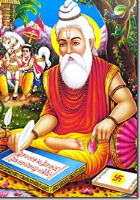Ayodrya, The Righteous City Poem by Valmiki
Ayodrya, The Righteous City
Rich in royal worth and valour, rich in holy Vedic lore,
Dasa-ratha ruled his empire in the happy days of yore,
Loved of men in fair Ayodhya, sprung of ancient Solar Race,
Royal rishi in his duty, saintly rishi in his grace,
Great as INDRA in his prowess, bounteous as KUVERA kind,
Dauntless deeds subdued his foemen, lofty faith subdued his mind!
Like the ancient monarch Manu, father of the human race,
Dasa-ratha ruled his people with a father's loving grace,
Truth and Justice swayed each action and each baser motive quelled
People's Love and Monarch's Duty every thought and deed impelled,
And his town like INDRA'S city,-tower and dome and turret brave-
Rose in proud and peerless beauty on Sarayu's limpid wave!
Peaceful lived the righteous people, rich in wealth in merit high,
Envy dwelt not in their bosoms and their accents shaped no lie,
Fathers with their happy households owned their cattle, corn, and gold,
Galling penury and famine in Ayodhya had no hold,
Neighbours lived in mutual kindness helpful with their ample wealth,
None who begged the wasted refuse, none who lived by fraud and stealth!
And they wore the gem and earring, wreath and fragrant sandal paste,
And their arms were decked with bracelets, and their necks with nishkas graced,
Cheat and braggart and deceiver lived not in the ancient town,
Proud despiser of the lowly wore not insults in their frown,
Poorer fed not on the richer, hireling friend upon the great,
None with low and lying accents did upon the proud man wait
Men to plighted vows were faithful, faithful was each loving wife,
Impure thought and wandering fancy stained not holy wedded life,
Robed in gold and graceful garments, fair in form and fair in face,
Winsome were Ayodhya's daughters, rich in wit and woman's grace
Twice-born men were free from passion, lust of gold and impure greed,
Faithful to their Rites and Scriptures, truthful in their word and deed,
Altar blazed in every mansion, from each home was bounty given,
'Stooped no man to fulsome falsehood, questioned none the will of Heaven.
Kshatras bowed to holy Brahmans, Vaisyas to the Kshatras bowed
Toiling Sudras lived by labour, of their honest duty proud,
To the Gods and to the Fathers, to each guest in virtue trained,
Rites were done with true devotion as by holy writ ordained,
Pure each caste in due observance, stainless was each ancient rite,
And the nation thrived and prospered by its old and matchless might,
And each man in truth abiding lived a long and peaceful life,
With his sons and with his grandsons, with his loved and honoured wife.
Thus was ruled the ancient city by her monarch true and bold,
As the earth was ruled by Mann in the misty days of old,
Troops who never turned in battle, fierce as fire and strong and brave,
Guarded well her lofty ramparts as the lions guard the cave.
Steeds like INDRA'S in their swiftness came from far Kamboja's land,
From Vanaya and Vahlika and from Sindhu's rock-bound strand,
Elephants of mighty stature from the Vindhya mountains came,
Or from deep and darksome forests round Himalay's peaks of fame,
Matchless in their mighty prowess, peerless in their wondrous speed,
Nobler than the noble tuskers sprung from high celestial breed.
Thus Ayodhya, 'virgin city,'-faithful to her haughty name,-
Ruled by righteous Dasa-ratha won a world-embracing fame,
Strong-barred gates and lofty arches, tower and dome and turret high
Decked the vast and peopled city fair as mansions of the sky.
Queens of proud and peerless beauty born of houses rich in fame,
Loved of royal Dasa-ratha to his happy mansion came,
Queen Kausalya blessed with virtue true and righteous Rama bore,
Queen Kaikeyi young and beauteous bore him Bharat rich in lore,
Queen Simitra bore the bright twins, Lakshman and Satruglina bold,
Four brave princes served their father in the happy days of old!
CONDENSED INTO ENGLISH VERSE
By Romesh C. Dutt (1899)
EPIC OF RAMA, PRINCE OF INDIA
BOOK I
SITA-SWAYAWARAn(The Bridal of Sita)
.............truly this city of righteousness... was also a city of happiness....beautiful poem..
This poem has not been translated into any other language yet.
I would like to translate this poem
Rāmāyaṇa is composed of about 480,002 words, being a quarter of the length of the full text of the Mahābhārata or about four times the length of the Iliad. The Rāmāyaṇa tells the story of a prince, Rāma of Ayodhyā, whose wife Sītā is abducted by the demon-king (Rākṣasa) of Laṅkā, Rāvaṇa. The Vālmīki's Rāmāyaṇa is dated variously from 500 BC to 100 BC, or about co-eval with early versions of the Mahābhārata. [from W.]